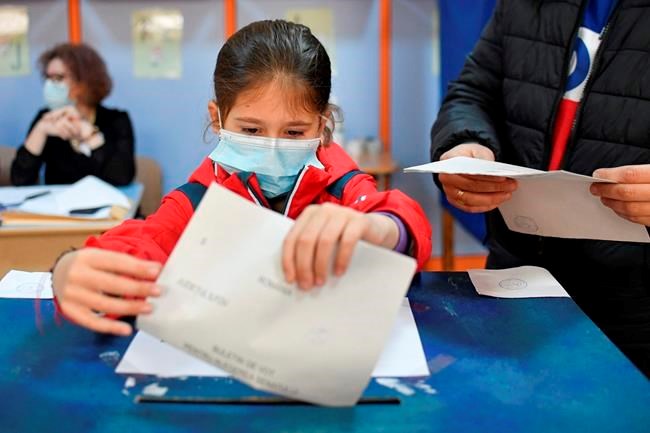BUCHAREST, Romania — Romanians voted Sunday in a legislative election that many hope will restore some stability in one of the poorest European Union nations after five years of political and social turmoil.
More than 18 million Romanians are registered to vote for a new national parliament, but turnout was expected to be low because of voters’ fears about becoming infected with the coronavirus.
To date, the EU’s seventh-most populous country has confirmed more than 500,000 cases of COVID-19 and more than 12,000 deaths.
According to most preelection polls, the
If the polls’ accuracy holds up, the mainstay party of Romania’s EU-aligned, austerity-prone social conservatives will, for the first time in its nearly three-decade history, become the largest party in the country’s 465-seat bicameral parliament. Still, it would fall short of a governing majority. Analysts predict the party will seek to create a governing coalition with the progressive USR-Plus alliance, which is forecast to capture around 20% of the vote.
Both campaigned on promises to depoliticize and fully reform Romania’s civil service, safeguard the independence of its judiciary, impose fiscal discipline and prop up the collapsing public health care and education systems.
But they appear to have somewhat divergent views on how best to get rid of the corruptive welfare state model and inefficient bureaucracy, blamed by both on decades of political supremacy in Romania of the left-leaning, populist Social Democrat Party, or PSD.
The Social Democrats have dominated Romania’s political life since the fall of communism in 1989, often in multi-party coalitions that at times included the PLN.
They won the last election in 2016 and ran through three prime ministers and dozens of ministers, before the PLN took the reins of a minority government a year ago. The PSD-led government has drawn heavy criticism from the EU for its interference with the judiciary and a cascade of corruption scandals involving some of the party’s most prominent members.
But although its chaotic recent tenure triggered two years of massive street protests, the PSD has appeared in recent months to be winning back some of the lost popular support as the minority government has been struggling to contain the economic fallout from the coronavirus pandemic by curbing social spending.
Recently, the PSD managed to push through the parliament a motion to raise all state pensions by 40%, ignoring the warnings by the country’s central bank that it was unfeasible.
It has a loyal base of support among Romania’s rural voters and has been projected to win over 20% of the vote.
As a result of the pandemic and virus containment measures, Romania’s fiscal deficit is expected to widen this year to around 9% of gross domestic product, compared with 4.3% in 2019. The coronavirus continues to spread in Romania, with almost two-thirds of all infections and nearly a half of all virus-related deaths so far having been registered in the past two months.
No special virus precautions — beyond general requirements to wear masks, sanitize hands and maintain social distancing — were put in place at 18,000 polling stations across the country.
According to data published by Romania’s Central Election Bureau, about 3.5 million people have cast their ballots by 3 p.m. local time (1300 GMT) on Sunday, or 3.3% fewer than at the same time point during the 2016 general election. Official results were expected overnight.
___
Follow AP’s coverage at https://apnews.com/hub/coronavirus-pandemic and https://apnews.com/UnderstandingtheOutbreak
The Associated Press



